

By Ray Pride Pride@moviecitynews.com
Film 2011: “Imagination Gangsters”
MOST MOVIE YEARS HAVE A GLEAMING EXCEPTION to list-making, a lucid, transparent exemplar of work that rises just out of reach year-end litanies. Last year, that film was Disorder; this year, what could it be but Steve James and Alex Kotlowitz’s The Interrupters? In the lengthy, unfinished edit presented at Sundance in January, its wallop was sustained over its ample length. The final edit, as seen in theaters and soon on Frontline, is a streamlined marvel of direction, editing, narrative tempo, the etching of characters and charts of their change that don’t fall simply to “arcs,” and, yes, the conjoined acts of looking and caring. (Plus, words like, an oath in anger, “Fuck a problem, fuck a solution.”)
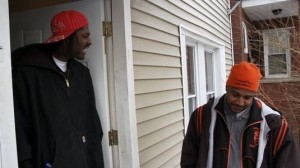 Writing from the world premiere almost exactly a year ago: “The film not only suggests, but demonstrates, through the heroic investment by its subjects, day to day, that the cycle of violence can be broken, and must be broken. In the words of one, the goal is ‘humility and not anger.’ These are powerful stories of trust, transformation, and renewal of hope in Chicago streets and the hearts of America. The closing shot is elegiac, literally dazzling, as sunset ripples golden-orange across the Chicago skyline seen from the west, not the Lake, and yet it also says Chicago, and cities, and Chicagoans, and the hope for a better nation still stand, and stand strong.”
Writing from the world premiere almost exactly a year ago: “The film not only suggests, but demonstrates, through the heroic investment by its subjects, day to day, that the cycle of violence can be broken, and must be broken. In the words of one, the goal is ‘humility and not anger.’ These are powerful stories of trust, transformation, and renewal of hope in Chicago streets and the hearts of America. The closing shot is elegiac, literally dazzling, as sunset ripples golden-orange across the Chicago skyline seen from the west, not the Lake, and yet it also says Chicago, and cities, and Chicagoans, and the hope for a better nation still stand, and stand strong.”
A list of ten more, with footnotes below.
1. Margaret
2. Drive
3. Melancholia
4. Take Shelter / Tree of Life
5. Tinker Tailor Soldier Spy
6. A Separation
7. Martha Marcy May Marlene
8. Shame
9. Road to Nowhere / Certified Copy
10. Aurora / Tuesday, After Christmas
A short shout, too, to the littlest guys rabbiting away at more sustainable means of distribution, including, but not limited to, Oscilloscope, Milestone, Variance, Vitagraph, The Film Desk, Factory 25, Icarus, Zeitgeist, Janus, Music Box Films, Kino-Lorber, Rialto, and Cinema Guild. (The Cinema Guild’s 2011-12 roster includes The Interrupters, Aurora, The Turin Horse, Once Upon a Time in Anatolia and new films by Hong Sangsoo and Grant Gee. Please survive.)
PLUS the programs, programmers and hospitality of 2011 festivals that I attended as a journalist or programmer, including Sundance; the Thessaloniki International Documentary Festival; “Illuminating The Shadows: Film Criticism In Focus” at Northwestern University’s Block Cinema; Hot Docs; Chicago Underground Film Festival; Chicago International Film Festival; my fellow jurors for Best Film Not Playing; the Thessaloniki International Film Festival; and the Marrakech International Film Festival.
[AS WELL AS A Chicago H/T to the year-round efforts of staff and programmers at the Siskel Film Center, the Music Box and Facets Multimedia, among a raft of small, new, termite venues.]
AND Sara Driver, at a press conference for her tribute at Thessaloniki 52, indelibly describing herself and Jim Jarmusch across their years working together as “imagination gangsters.”
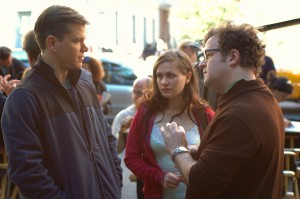 1. Margaret (Kenneth Lonergan) A frayed-nerves feat of furious articulation. Lisa Cohen (Anna Paquin) is a privileged young woman whose confusions run from mother to father, to sex, to the life of the mind, to elemental guilt. Thematically, “survivor guilt” after 9/11 resounds in Lisa’s witness to, and potential cause of, the death of a woman who’s hit by a city bus. The profusion of life, of life in Manhattan post-9/11, of life that eddies in all directions, is novelistic in ambition, Dickensian in a welter of cracked legalisms. Paquin brandishes a bravura performance—shrill, feral, emphatic, self-dramatizing, self-cautioning, self-aware, self-immolating—that is like nothing I’ve ever seen. She’s in Lisa’s skin and it’s an uncomfortable place. There’s a repeated fugue as interlude, figures on the city’s sidewalks caught in extreme slow-motion, with Ryszard Lenczewski’s cinematography tending to the shadow-bruised, the ashen. A shaft of light will suddenly pick someone out in the deep distance, their faces illumined in full proper focus for a brief instant. This, too, is Lonergan’s dramatic impulse: how do we all mesh? What’s teeming just beyond all parameters of the frame? The sudden, thrilling, earned ending is an impulsive and perfect and human moment: a little lunge toward tenderness. Plus: the promise of the Schoonmaker-Scorsese cut, nestling on a hard drive somewhere out there.
1. Margaret (Kenneth Lonergan) A frayed-nerves feat of furious articulation. Lisa Cohen (Anna Paquin) is a privileged young woman whose confusions run from mother to father, to sex, to the life of the mind, to elemental guilt. Thematically, “survivor guilt” after 9/11 resounds in Lisa’s witness to, and potential cause of, the death of a woman who’s hit by a city bus. The profusion of life, of life in Manhattan post-9/11, of life that eddies in all directions, is novelistic in ambition, Dickensian in a welter of cracked legalisms. Paquin brandishes a bravura performance—shrill, feral, emphatic, self-dramatizing, self-cautioning, self-aware, self-immolating—that is like nothing I’ve ever seen. She’s in Lisa’s skin and it’s an uncomfortable place. There’s a repeated fugue as interlude, figures on the city’s sidewalks caught in extreme slow-motion, with Ryszard Lenczewski’s cinematography tending to the shadow-bruised, the ashen. A shaft of light will suddenly pick someone out in the deep distance, their faces illumined in full proper focus for a brief instant. This, too, is Lonergan’s dramatic impulse: how do we all mesh? What’s teeming just beyond all parameters of the frame? The sudden, thrilling, earned ending is an impulsive and perfect and human moment: a little lunge toward tenderness. Plus: the promise of the Schoonmaker-Scorsese cut, nestling on a hard drive somewhere out there.
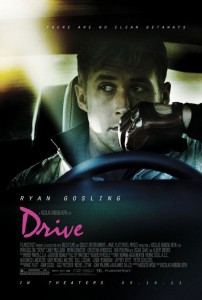 2. Drive (Nicolas Winding Refn) The unnamed driver (Ryan Gosling) meets a young mother (Carey Mulligan) in his picturesquely shabby apartment building, where he’s behind the door of apartment “405.” (Rimshot.) It’s the small, tingling grace notes that elevate Drive into what Refn claims it is, or the cinephilic repository that it also represents, such as the first meeting of the man and woman in the building’s elevator, two unmatched gazes, seeing, not seeing, each other. And once they’ve met, when she asks where he works and he answers, “Reseda Boulevard,” and Gosling stretches those syllables into something abstract and lyrical along his tongue, and in an ideal cut, Refn cuts to Mulligan indicating, yes, in this very second she may have well opened up to the possibility of loving this man. An awareness: this is a moment. I am in this moment. Not this is history, this is my destiny, but an engaged gaze that says: I am in this moment.
2. Drive (Nicolas Winding Refn) The unnamed driver (Ryan Gosling) meets a young mother (Carey Mulligan) in his picturesquely shabby apartment building, where he’s behind the door of apartment “405.” (Rimshot.) It’s the small, tingling grace notes that elevate Drive into what Refn claims it is, or the cinephilic repository that it also represents, such as the first meeting of the man and woman in the building’s elevator, two unmatched gazes, seeing, not seeing, each other. And once they’ve met, when she asks where he works and he answers, “Reseda Boulevard,” and Gosling stretches those syllables into something abstract and lyrical along his tongue, and in an ideal cut, Refn cuts to Mulligan indicating, yes, in this very second she may have well opened up to the possibility of loving this man. An awareness: this is a moment. I am in this moment. Not this is history, this is my destiny, but an engaged gaze that says: I am in this moment.
3. Melancholia (Lars Von Trier). Crushing. The weight of the worlds. The center of the world: Kirsten Dunst. Magnificent. There’s expressive greatness in her performance: quivering, alive, hurt. Not beauty: humanity. The world ends not with a bang, but a human face.
4. Tinker Tailor Soldier Spy (Tomas Alfredson). The level in the details: each level of imagery is immaculately imagined, especially Maria Djurkovic’s production design, creating a world the color of whiskey and tea and nicotine—not nostalgic, but muted and drawn—curtains, sheers, windows, dividers, glass: things obscured, things observed in pearly drab.
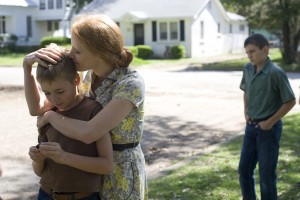 5. Take Shelter (Jeff Nichols) / The Tree of Life (Terence Malick). Shelter: The wicked, damaged splendor to what Curtis sees. Viscous tan-black dribs of oil fall from the sky. Stopped on the verge of a highway, the night sky fires and streaks with bolts and clusters, like crests of ganglia and neuron bursting from the skull in ordinary madness. He imagines the planet, he’s at its center, the weather goes mad around him. Curtis seems a sainted fool somewhere between cousin Johannes in Dreyer’s Ordet, Richard Dreyfuss in Close Encounters Of The Third Kind and Lodge Kerrigan’s errant schizophrenics. His daily life crumbles. When Samantha finally confronts Curtis, they’re surrounded by a patch of fireflies—no one noticing—rising, luminous, visible; unseen. The fireflies hang, drift, blink, out of focus, blots of light as if you scrunched your eyes closed so very tightly. The possibility of the deadly storm or an “airborne toxic event,” the phrase for the commonplace apocalypse in Don DeLillo’s “White Noise,” seems to be only in one man’s head, but then the ending is as simply and as directly about faith as the end of Ordet. Nichols’ hallucination of latter-day trepidation offers a stunning moment, yes, of transcendence, conveyed by, among other details, a husband and wife’s exchange of nods and two words that say everything: “Sam.” “Okay.” Tree: Superficially, yes, Malick’s gone native once more, following the breeze and tendril, but he interleaves the dandle and the caress, a lexicon of physical human gestures that repeat in other measure. A turn of a mother’s pale calf is also her unexplained dream of soaring into the air in the front yard, unobserved, but also a neighbor woman’s calf, but also how the human form turns, turns, back also moves to the light, to the light, and back, the source, the lamp, the limpid life of flicker or incandescence, modest against the star-spokes of late-day sun as it deliquesces into orange and pink pinpoint behind beloved mother’s head.
5. Take Shelter (Jeff Nichols) / The Tree of Life (Terence Malick). Shelter: The wicked, damaged splendor to what Curtis sees. Viscous tan-black dribs of oil fall from the sky. Stopped on the verge of a highway, the night sky fires and streaks with bolts and clusters, like crests of ganglia and neuron bursting from the skull in ordinary madness. He imagines the planet, he’s at its center, the weather goes mad around him. Curtis seems a sainted fool somewhere between cousin Johannes in Dreyer’s Ordet, Richard Dreyfuss in Close Encounters Of The Third Kind and Lodge Kerrigan’s errant schizophrenics. His daily life crumbles. When Samantha finally confronts Curtis, they’re surrounded by a patch of fireflies—no one noticing—rising, luminous, visible; unseen. The fireflies hang, drift, blink, out of focus, blots of light as if you scrunched your eyes closed so very tightly. The possibility of the deadly storm or an “airborne toxic event,” the phrase for the commonplace apocalypse in Don DeLillo’s “White Noise,” seems to be only in one man’s head, but then the ending is as simply and as directly about faith as the end of Ordet. Nichols’ hallucination of latter-day trepidation offers a stunning moment, yes, of transcendence, conveyed by, among other details, a husband and wife’s exchange of nods and two words that say everything: “Sam.” “Okay.” Tree: Superficially, yes, Malick’s gone native once more, following the breeze and tendril, but he interleaves the dandle and the caress, a lexicon of physical human gestures that repeat in other measure. A turn of a mother’s pale calf is also her unexplained dream of soaring into the air in the front yard, unobserved, but also a neighbor woman’s calf, but also how the human form turns, turns, back also moves to the light, to the light, and back, the source, the lamp, the limpid life of flicker or incandescence, modest against the star-spokes of late-day sun as it deliquesces into orange and pink pinpoint behind beloved mother’s head.
6. A Separation (Asghar Farhadi) Responsibilities: everyone’s.
7. Martha Marcy May Marlene (Sean Durkin) Durkin and his cinematographer Jody Lee Lipes lace the tapestry with green herrings: the rustic countryside is a place of little but omens and the underfurnished weekend home of her sister and her husband is a place of forbidding, plain spaces. The two zones are linked at one point by a dive into water; the descent into the lake of privilege, through a sudden cut, becomes the mingling of nude young bodies skinny-dipping directionlessly below the surface of a rural creek. Martha runs away at the beginning of the film, and a simple shot is as suggestive as minutes of montage. The camera pulls back from whispering trees in a stand of green. A voice calls out as she disappears from sight, “Martha! Marcy May!” The shot is lyrical, the camera’s move gentle on a simple frame yet suggestive and rich with multiple sensations, suggesting poetry, omen, even horror. This green space does not nurture.
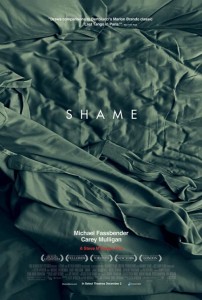 8. Shame (Steve McQueen) A long take plays out the discomfiting comedy of a dinner date served by a lousy waiter. All goes awry in movement and moment and minutiae. Every social grace, every touch toward intimacy, alarms Brandon. His date asks, “What’s your longest relationship” as we hear the suck sound of a wine cork as it’s pulled, she pulls a face, wrinkles her nose, we hear the wine slop into a glass: it’s the contortions of Brandon’s insides, too. The play of eyes and dance of glance in the bookending last scene is a tease, another tease, still, teasing, repeating, as another possible scenario unfolds. Brandon and a woman watch each other, look away. In mid-focus in the near background an older man’s dangling yellow scarf like the woman’s shoulder-length blonde hair—cold colors, cool composition, exquisite rhyming elements, again. Brandon looks, watches, what does he see? What’s behind his wide-eyed vulpine watchfulness? Shame? Hunger.
8. Shame (Steve McQueen) A long take plays out the discomfiting comedy of a dinner date served by a lousy waiter. All goes awry in movement and moment and minutiae. Every social grace, every touch toward intimacy, alarms Brandon. His date asks, “What’s your longest relationship” as we hear the suck sound of a wine cork as it’s pulled, she pulls a face, wrinkles her nose, we hear the wine slop into a glass: it’s the contortions of Brandon’s insides, too. The play of eyes and dance of glance in the bookending last scene is a tease, another tease, still, teasing, repeating, as another possible scenario unfolds. Brandon and a woman watch each other, look away. In mid-focus in the near background an older man’s dangling yellow scarf like the woman’s shoulder-length blonde hair—cold colors, cool composition, exquisite rhyming elements, again. Brandon looks, watches, what does he see? What’s behind his wide-eyed vulpine watchfulness? Shame? Hunger.
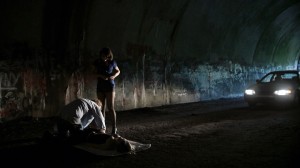 9. Road to Nowhere (Monte Hellman) / Certified Copy (Abbas Kiarostami) Kiarostami’s film is fatally flawed by its male lead, set against the gleaming Juliette Binoche. Or was the script, co-written by Jean-Claude Carrière, built on doubling, meant to refract her charisma against his baleful inertness as another of its layers? Hellman sets a film director in the middle of his mystery, and Tygh Runyan’s performance seems wrong on first apprehension, especially against the sidling, suggestive perfume of Shannyn Sossamon’s underplayed presence. Yet… as the noir-within-noir script (written by Steven Gaydos) slip-slides between mysteries, genuine and feigned, there’s a consistent, brooding air that rises above the concern about the acting, functioning more as puzzle than game, palimpsest than straight-ahead narrative, looking-back-glass than mere structural vertigo. (Gaydos describes the meat of the meta as “a movie about a movie about a movie about a true story that isn’t true”; Hellman lists more than fifty references inscribed into the film here.) It’s a stream-of-subconscious I’ve puzzled over for months, and a shot that incorporates the fate of a small plane from an overcast sky above a dead sylvan lake is indelible: fate is a gunshot, a tumble, a story forever shifting in mind. Alain Robbe-Grillet explained his own work came through a method of precisely, accurately describing something that never happened in a place that never existed. Along a road to nowhere…
9. Road to Nowhere (Monte Hellman) / Certified Copy (Abbas Kiarostami) Kiarostami’s film is fatally flawed by its male lead, set against the gleaming Juliette Binoche. Or was the script, co-written by Jean-Claude Carrière, built on doubling, meant to refract her charisma against his baleful inertness as another of its layers? Hellman sets a film director in the middle of his mystery, and Tygh Runyan’s performance seems wrong on first apprehension, especially against the sidling, suggestive perfume of Shannyn Sossamon’s underplayed presence. Yet… as the noir-within-noir script (written by Steven Gaydos) slip-slides between mysteries, genuine and feigned, there’s a consistent, brooding air that rises above the concern about the acting, functioning more as puzzle than game, palimpsest than straight-ahead narrative, looking-back-glass than mere structural vertigo. (Gaydos describes the meat of the meta as “a movie about a movie about a movie about a true story that isn’t true”; Hellman lists more than fifty references inscribed into the film here.) It’s a stream-of-subconscious I’ve puzzled over for months, and a shot that incorporates the fate of a small plane from an overcast sky above a dead sylvan lake is indelible: fate is a gunshot, a tumble, a story forever shifting in mind. Alain Robbe-Grillet explained his own work came through a method of precisely, accurately describing something that never happened in a place that never existed. Along a road to nowhere…
10. Aurora (Cristi Puiu) / Tuesday, After Christmas (Radu Muntean) Two sides of the intense contemporary style of Romanian filmmaking, trading in focused acting and extended takes. Puiu’s elliptical story of a man, wronged, wronging, is splendid mystery and as cold to its viewers as to its horrible protagonist; Muntean’s dissection of the wages of adultery is precise about another mystery: why we do what we do.
Nine finer feature films I’ll punt as 2012 releases (links to trailers):
Alps (Yorgos Lanthimos)
Attenberg (Rachel Athina Tsangari)
Elena (Andrei Zvyagintsev)
Goodbye First Love (Mia Hansen-Løve)
The Hunter (Rafi Pitts)
Miss Bala (Gerardo Naranjo)
Once Upon A Time in Anatolia (Nuri Bilge Ceylan)
Oslo, August, 31st (Joachim Trier)
The Turin Horse (Béla Tarr)
No Sale:
The Artist (Michel Hazanavicius). Keen pastiche, a terrific trifle offering Singin’ in the Rain-variety reassurance to the modern movie industry that its origins were joyous and true and good. To appropriate Jonathan Rosenbaum’s phrase, “Goodbye, Cinema: Hello, Cinephilia!” Masses will be entertained, and rightly so. It’s not a feel-good movie; It’s A Feel Great Movie!
Midnight in Paris (Woody Allen) The splendid thing that erupts from the schematic script is how the actors are, as in most late Allen, the performer is left to become the hero of their own history, each actor left to light their corner of the frame. And so we have Corey Stoll’s Clutch Cargo-cum-Ernest Hemingway, a strong and sturdy caricature, and a good one, too; Adrien Brody’s cricket-jitter epicene-shy-of-a-sneezing-fit Salvador Dali; Kathy Bates’ never-make-eye-contact but-weight-the-room Gertrude Stein. And also Rachel McAdams’ whiny, unworthy shiksa, Marion Cottilard’s butter-croissant smile and Michael Sheen’s pettifogging fact-flogger, another Allen pseudo-intellectual to be carted out to forestall any accusations Mr. Konigsberg himself would be anything so… unworthy.
The Muppets (James Bobin). Unfelt.
2011 releases still to be seen:
City of Life and Death (Lu Chuan)
Detective Dee and the Mystery of the Phantom Flame (Tsui Hark)
The Loneliest Planet (Julia Loktev)
Mildred Pierce (Todd Haynes)
The Mysteries Of Lisbon (Raul Ruiz)
This Is Not A Film (Jafar Panahi)
We Need to Talk About Kevin (Lynne Ramsay)
And 33 more that offer moments of oohs and awe:
Another Earth (Mike Cahill). Cruel, selfish lead character inhabited by quicksilver Brit Marling. The fragrant conceit itself, casually decorative, so different than the second planet in Melancholia. And: the penultimate cut.
Attack the Block (Joe Cornish). “I was looking for anything in this world that reminded me of science fiction. I wanted to make a science fiction film set in this world that didn’t betray the reality, or the rules of the world. So the block looked like a spaceship. The BMXes that they ride reminded me of E. T. The architecture reminded me of Metropolis and the language did remind me of Nadsat from ‘A Clockwork Orange.’ Science fiction is full of little secret terms, isn’t it, that only cognoscenti understand. You feel like you’re in that world, you feel like you could have a conversation with them. That’s what excited me. I dunno. I just think it’s cool the way that young people invent a secret language that adults understand. I think it’s probably part of the process of language evolving, really.” [Interview.]
 Beginners (Mike Mills) “It’s this idea, you’re taking all these elements that exist, it’s like reportage. I love that idea. And a lot of my writing is very much observation. But then also to me, it’s collage also in the sense of like Godard, as a collage of techniques or strategies in his essayistic form. Or to me, the other huge one is ‘The Unbearable Lightness of Being,’ the book, not the movie, where there’s an essay about kitsch, an essay about misunderstood words, there’s a real love story, a history of the Russian invasion of Czechoslovakia… In that way, it’s like a collage of modes.” [Interview.]
Beginners (Mike Mills) “It’s this idea, you’re taking all these elements that exist, it’s like reportage. I love that idea. And a lot of my writing is very much observation. But then also to me, it’s collage also in the sense of like Godard, as a collage of techniques or strategies in his essayistic form. Or to me, the other huge one is ‘The Unbearable Lightness of Being,’ the book, not the movie, where there’s an essay about kitsch, an essay about misunderstood words, there’s a real love story, a history of the Russian invasion of Czechoslovakia… In that way, it’s like a collage of modes.” [Interview.]
Cold Weather (Aaron Katz). The sound of a small city in the Northwest is ever in the middle ground: a freight’s horn sounds beyond the hills. Streetcars approach. A motel room’s room tone is muffled just so. An Amtrak train enters and exits. Wim Wenders once said the saddest image he knew was an unbroken shot of a horizon line in which a train enters, crosses, then vanishes from frame. Katz’s gambit with just such a shot is one character’s line to another at the bus stop as the train goes: “Where you headed?”
 The Color Wheel (Alex Ross Perry). The central, extended shot where the dramatic stakes of Perry’s black comedy come to fruition: there’s an extended, unbroken take that lasts the length of a reel of 16mm film, including a bracingly clumsy reframing by the camera operator, as if the film itself had skipped a heartbeat, lurching object (and subject) into telling close-up. The scene shocks formally as well as emotionally, and it earns a scar its participants will touch fondly in memory for the rest of their lives.
The Color Wheel (Alex Ross Perry). The central, extended shot where the dramatic stakes of Perry’s black comedy come to fruition: there’s an extended, unbroken take that lasts the length of a reel of 16mm film, including a bracingly clumsy reframing by the camera operator, as if the film itself had skipped a heartbeat, lurching object (and subject) into telling close-up. The scene shocks formally as well as emotionally, and it earns a scar its participants will touch fondly in memory for the rest of their lives.
Contagion (Steven Soderbergh). The chilly ending, the proof of a thesis: all the questions the world wanted answered are demonstrated, swiftly, vividly, viscerally, ending on a simple touch, as brief as photos. This is how the world works, like it or not.
Der Brand (Brigitte Bertele). The palpable chill of self-loathing: plus a revenge plot icier than Love Crimes.
The Descendants (Alexander Payne). For once, Payne didn’t seem like a character-hater, but others disagree.
50/50 (Jonathan Levine). For Levine’s eagerness to merge vulgarity and pathos while demonstrating an ability to tell stories in clean, expressive images, and for provoking Bret Easton Ellis’ surly tweet, deleted after its November 24 posting; “50/50: equivalent of seeing cute puppy beaten with stick for two hours. Most adorable actor of our generation given cancer: opportunistic.”
Film Socialisme (Jean-Luc Godard). Color, fielded. The Kino Lorber Blu-Ray captures its searing digital world, and also allows the option of proper subtitles (unlike the theatrical release).
![]() The Future (Miranda July). The moment of transcendence, that elevates The Future into something remarkable is when Sophie, left to her own devices in a strange man’s bedroom, finally discovers and performs an expressive dance, wrapped in a sea-sized yellow t-shirt, its folds as descriptive as the billowing costumes for many Martha Graham dances, in which an entire female form is consumed, subsumed, transformed by fabric.
The Future (Miranda July). The moment of transcendence, that elevates The Future into something remarkable is when Sophie, left to her own devices in a strange man’s bedroom, finally discovers and performs an expressive dance, wrapped in a sea-sized yellow t-shirt, its folds as descriptive as the billowing costumes for many Martha Graham dances, in which an entire female form is consumed, subsumed, transformed by fabric.
The Girl With the Dragon Tattoo (David Fincher). The sound and sight of a smashed tooth spat. Letters on a hacked email spit out: “What going on with these two fucking assholes?” and strings of green computer code racing past with the most serious of search delimiters. Lisbeth’s here-unnamed hacker pal wearing a “NIN” t-shirt. Lisbeth, on the other hand, megapetite in her worn-and-all-but-chewed black “FUCK YOU YOU FUCKING FUCK” t-shirt, as broken in as a comfy, practiced scowl. The squeak of her leather jacket under a hoodie as she tenses is another matter, like the gentlest ping as she leathers with a thumb the lipstick print of her red lips off a bone-white coffee cup.
The Guard (John Michael McDonagh). John Ford meets Preston Sturges with a bit of craic and Brendan Gleeson playing a clandestine Irish intellectual.
Hanna (Joe Wright). There aren’t many high-functioning Asperger’s, tongue-in-cheek, Jesus-girl, killer-child thrillers in the market, which makes even the wooziest and blowziest moments of Hanna startling. A jarring mix of tones prevails, at one moment in settings that suggest Fassbinder making a Modesty Blaise and others, the Euro-oddness of the more gregarious films by Fatih Akin, like Im Juli or Soul Kitchen. As shot by the gifted Alwin Küchler and tethered to the serene, slightly sinister percolation of a score by the Chemical Brothers, the world outside is otherworldly, as if we, the audience, were pitched into as much strangeness as bright young Hanna.
Hors Satan (Bruno Dumont). Madness under the low clouds of rural France! A painter and his fallen flock: Bruno Dumont.
Hugo (Martin Scorsese). The heart of Méliès’ dreams, sprung into motion by the cautious insertion of a Maltese Cross into its mechanism.
The Ides Of March (George Clooney) A serene simulacrum of a 1970s American thriller, needing much higher stakes for a splendid cast to catch fire.
 Incendies (Denis Villeneuve). The steely elegance of Villeneuve’s emphatic camera movements and framing are as much of the “story” as the terrors past unearthed by two grown, yet innocent children. One image: two flashlights play in blackest night across shallow water above visible stones: one of many visual correlatives for the feat of storytelling itself. (As well, the chop of water always holds amniotic potential in Incendies.)
Incendies (Denis Villeneuve). The steely elegance of Villeneuve’s emphatic camera movements and framing are as much of the “story” as the terrors past unearthed by two grown, yet innocent children. One image: two flashlights play in blackest night across shallow water above visible stones: one of many visual correlatives for the feat of storytelling itself. (As well, the chop of water always holds amniotic potential in Incendies.)
Le quattro volte (Michelangelo Frammartino). At the final shot, which coils into the most essential and transcendent of epiphanies: the entire movie has quietly, purposely, artfully moved toward this split-second of grace and we warm by it. It’s like the slightest of nudges, the gentlest of touches, a nod that says, “Look. See? Here is the world, complete.”
 Like Crazy (Drake Doremus). A thousand fleeting thoughts, of fleeing sensations of desire that come from both the first romantic flushes of love but also from the darker sensations of disappointment. From their first date, where a pillar divides the table and the camera looks at one, then the other, less like a voyeur or a spy, but rather one of their better angels seeking out a better angle. It’s Felicity Jones’ overbite peeking out just so, or their bare feet curling against one another once more. It’s a flicker of want on her face or a sudden transformation into confusion by Anton Yelchin. They’re building blocks of uncommon intimacy. Surrounded by cell phone cameras, surveillance camera and that one person, if you’re lucky, who loves you and captures that one sweet ineffable moment in flight that is somehow the essence of happiness and all you can do is smile when you’re handed the camera to look at the image on the screen.
Like Crazy (Drake Doremus). A thousand fleeting thoughts, of fleeing sensations of desire that come from both the first romantic flushes of love but also from the darker sensations of disappointment. From their first date, where a pillar divides the table and the camera looks at one, then the other, less like a voyeur or a spy, but rather one of their better angels seeking out a better angle. It’s Felicity Jones’ overbite peeking out just so, or their bare feet curling against one another once more. It’s a flicker of want on her face or a sudden transformation into confusion by Anton Yelchin. They’re building blocks of uncommon intimacy. Surrounded by cell phone cameras, surveillance camera and that one person, if you’re lucky, who loves you and captures that one sweet ineffable moment in flight that is somehow the essence of happiness and all you can do is smile when you’re handed the camera to look at the image on the screen.
Margin Call (JC Chandor). Men’s white, pallid, ravaged faces on a multibillion-dollar dark night of the soul. Let Jeremy Irons speak.
Meek’s Cutoff (Kelly Reichardt). Landscape, framed.
 The Mill and the Cross (Lech Majewski). The protracted opening scene of dawn stirring in a succession of households, from young to elderly, from clothed to nude, starts on a nest of unnumbered boys in sworls of blanket and duvet like so many giggling mice. Their boy-doings include a duel of armpit farts, which are intercut with Breughel poking attentively at a spider in its dew-diamonded web. From deep shadows at dawn of Rembrandt dark to a town beginning to move through mist not yet burned all, there are all modest yet lavish intimations of bustling community and of the artist’s patterning of it all. The tiniest things sing, including a sword applied to an oiled whetstone wheel that pings like a bell.
The Mill and the Cross (Lech Majewski). The protracted opening scene of dawn stirring in a succession of households, from young to elderly, from clothed to nude, starts on a nest of unnumbered boys in sworls of blanket and duvet like so many giggling mice. Their boy-doings include a duel of armpit farts, which are intercut with Breughel poking attentively at a spider in its dew-diamonded web. From deep shadows at dawn of Rembrandt dark to a town beginning to move through mist not yet burned all, there are all modest yet lavish intimations of bustling community and of the artist’s patterning of it all. The tiniest things sing, including a sword applied to an oiled whetstone wheel that pings like a bell.
Moneyball (Bennett Miller) Billy Beane’s daughter, singing, “I’ve got to just let it go and enjoy the show.” The light on Brad Pitt’s face: this film is no longer about baseball, but about second chances and second-second chances and simple hopefulness.
The Skin I Live In (Pedro Almodóvar). Graphomania of the highest odor.
Source Code (Duncan Jones). Explosive Chicago. Time after time.
Submarine (Richard Ayoade). “Her breath smelled of milk, Polo Mints and Dunhill International… Her tongue was blue from blackcurrant squash.”
 Trigger (Bruce McDonald) A gentle two-hander for the late Tracey Wright and Molly Parker with many grace notes: a loving memorial, but also a collaboration as Wright’s last days passed. For the long-alienated rock-‘n’-roll friends, Daniel MacIvor serves the words, the sullen dynamic, serenely.
Trigger (Bruce McDonald) A gentle two-hander for the late Tracey Wright and Molly Parker with many grace notes: a loving memorial, but also a collaboration as Wright’s last days passed. For the long-alienated rock-‘n’-roll friends, Daniel MacIvor serves the words, the sullen dynamic, serenely.
Tyrannosaur (Paddy Considine). Opening with its protagonist, drunk from the pub, kicking his own dog to death? Dare to empathize now: All the lines on Mullan’s face seem earned once they teem with tears. Olivia Colman, also fine.
Weekend (Andrew Haigh) Longing: when do you see that, feel that, in the commonplace romantic comedy? And intimacy, demonstrated like this? It ought to be simple, shouldn’t it? Weekend is easy: a beautifully structured, seductive, emotional revelation.
Win Win (Tom McCarthy) Surely goodness and kindness… McCarthy gives very good actors room to amble around. Amy Ryan has one moment on her great, expressive face, where she says to the boy as his mother has come to stake a claim, “You know we love you,” and she makes a weird little expression, a sprightly moue. It’s exquisite for both precision and innate charm.
Without (Mark Jackson). A startling debut drama: A woman walks into the woods. Quiet will do her good. A little calm. Or not: Joslyn Jensen physically embodies a mind, a soul, set adrift, but it’s Jackson’s imagining of the low-cloud Pacific Northwest setting of that provides a setting for the slow disintegration of an obsessive young woman sent to care for a mute, catatonic man. Minimalist yet resplendent, shot with the Canon 5D Mark II, Without is what modern regional cinema can be, as well as cinema of blistering, pained eroticism. Without knows, shows fear.
Young Adult (Jason Reitman). Mr. Patton Oswalt. Ms. Charlize Theron.













